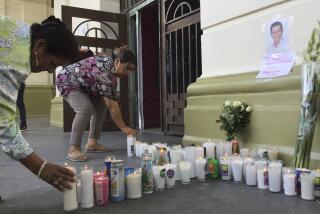PRI Seizure in Tabasco Raises New Fears : Mexico: Ruling party governor forces way into office. Some question commitment to reform.
- Share via
MEXICO CITY — President Ernesto Zedillo’s political dilemma in the southern state of Tabasco deepened Friday after the state’s ruling party governor forced his way into the statehouse amid a violent mob and a shower of police tear gas.
“I’m here through your popular mandate,” Gov. Roberto Madrazo Pintado told local members of the ruling Institutional Revolutionary Party from the balcony of the governor’s mansion in the state capital, Villahermosa. In open defiance of federal authority, the hundreds of Madrazo loyalists stoned opposition demonstrators and burned their tents, while state police used tear gas and clubs to drive both sides away.
Thursday night’s ruling party takeover of the downtown square ended a three-week opposition protest that claimed Madrazo was elected in November through ruling party fraud. And it spurred opposition leaders to question Zedillo’s ability to democratize Mexico.
This week’s PRI uprising in Tabasco was spurred by rumors--which Madrazo denied Friday--that Zedillo had negotiated the governor’s resignation earlier in the week.
*
When the smoke cleared Friday, Madrazo was sitting in his office for the first time since his Dec. 31 inauguration. Most businesses reopened after ruling party demonstrators removed roadblocks that had paralyzed the state for two days.
Opposition leaders ordered their party faithful not to seek revenge. But fear spread throughout southern Mexico and to the halls of power in Mexico City that the Tabasco rebellion had set a dangerous precedent amid deepening political and economic uncertainty.
In the nation’s capital, Zedillo’s top Cabinet aide, Interior Secretary Esteban Moctezuma Barragan, continued to issue appeals for urgent dialogue between the ruling party and the opposition in Tabasco.
“The federal government expresses profound concern,” declared Moctezuma in calling on local PRI officials and state leaders of the Democratic Revolutionary Party, or PRD, to begin immediate “negotiations on a definitive political solution.”
*
Moctezuma’s warning came as ruling party leaders in the neighboring state of Chiapas threatened to resolve a similar post-election conflict the way their Tabasco colleagues had done.
The Chiapas dispute is compounded by the presence of an armed indigenous Mexican guerrilla group, which supports opposition demands that ruling party Gov. Eduardo Robledo Rincon resign and the PRD candidate take his place.
Analysts said a similar uprising by the PRI in Chiapas could torpedo pending peace talks between the government and the Zapatista National Liberation Army rebels and trigger civil war in the state.
Political analysts said they hope Zedillo will act soon to defuse these politically explosive confrontations.
“Already, there has been aggression in Villahermosa, and with masses of irritated and antagonized demonstrators in the streets, the risk of friction and the explosion of fury is high, and possibly uncontrollable,” Mexico City columnist Miguel Angel Granados Chapa said.
Zedillo has promised to separate party and state. His first attempts to turn such reforms into law came just 24 hours before the Tabasco rebellion, in an accord also signed by all major opposition parties.
Opposition leaders in the capital Friday seized on the state party violence in Tabasco as an illustration of the urgent need for such reforms, of the resistance to true democracy from within the party that has governed Mexico for 65 years and of the inability of Zedillo’s 6-week-old government to prevent such violence by party hard-liners.
The ruling party leadership in Mexico City officially said it still supports Zedillo’s effort to reform election laws that helped lead to the conflicts in Tabasco and Chiapas.
But such declarations did little to dampen opposition claims that the Tabasco rebellion was orchestrated by ruling party hard-liners--both at the state and federal level--to undermine moves toward democracy.
“The aggression against our party members in Tabasco was not spontaneous. It was an action perfectly calculated,” said Reymundo Cardenas, a member of the PRD’s national executive committee in the capital. He linked the Tabasco rebellion directly to the national accord on electoral reform signed at Zedillo’s official residence Tuesday night.
Specifically, he blamed hard-liners within the PRI who are the “most reactionary against Mexico changing to a democracy, because they feel they will lose their privilege if the country takes the democratic path.”
Cardenas also warned that “there are great risks . . . of much more violence in other parts of the country” after the events in Villahermosa. But he insisted that his party, which has staged similar opposition rebellions amid post-election conflicts in the past, will not seek revenge.
“We are going to act to avoid all provocations,” he said. “We think it is now clear where the violence and the resistance to democracy and political solutions is coming from.”
More to Read
Sign up for Essential California
The most important California stories and recommendations in your inbox every morning.
You may occasionally receive promotional content from the Los Angeles Times.










